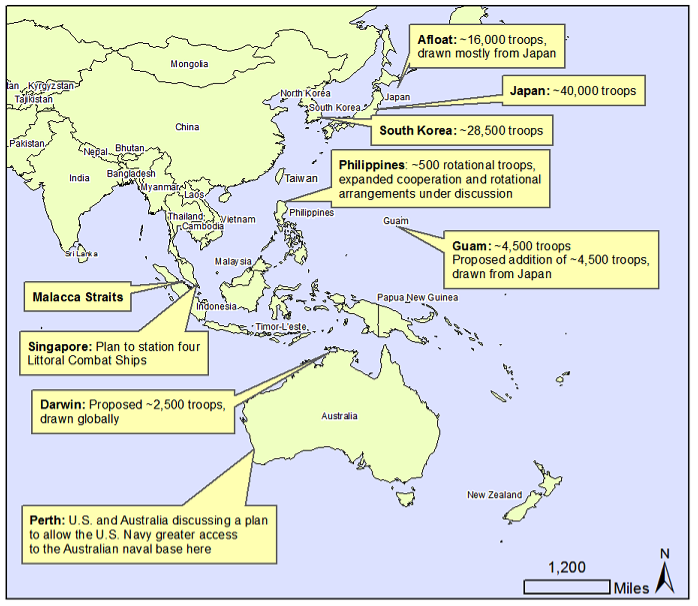Source: Pivot to the Pacific? The Obama Administration’s “Rebalancing” Toward Asia
Month: April 2012
Imperial ‘Pivots’ in Africa and Asia
In my latest conversation with Scott Horton on Antiwar Radio, we discussed the renewed focus Washington has had on Africa, particularly in the first term of the Obama administration. As part of a larger foreign policy I wrote about here and here, the U.S. is now supporting and training armies throughout Africa, is engaged in a proxy war in Somalia, backed regime change in Libya, sent combat troops to Uganda and surrounding territories, is fighting a manufactured threat in Nigeria, et al.
I talked about how part of this greater imperial focus on Africa is to counter China’s increasing economic ties to the continent and its overall rising influence as a geopolitical power. Indeed, “China-Africa trade grew 1000% from $10 billion in 2000 to $107 billion in 2008,” according to Zbigniew Brzezinski’s new book Strategic Vision (p. 81).
This perspective is in line with the Obama administration’s so-called “pivot” to Asia-Pacific. Officially announced in January, this renewed focus on the empire in Asia-Pacific is an attempt to contain China’s economic and military influence. Economic and military hegemony is for America, goes the thinking of Imperial Grand Strategy, and those who threaten our unmatched superiority are to be met with the threat of force and coercion. To this end, Obama has announced troop deployments to Australia, Singapore, and the Philippines. He has strengthened economic and military ties to South Korea, Japan, Thailand, Guam, etc.
Occasionally, Obama will publicly berate China for “breaking the rules” (a sin quite foreign to Washington, of course) and for not being “responsible” (read: obedient to Washington). Brzezinski, an imperial apparatchik himself, writes in his book that a focus on Asia is needed, but even he thinks Obama’s approach is overly confrontational. As he told Slate in January, “to define our engagements in the east in terms of China is a mistake. We have to focus on Asia but not in a manner that plays on everyone’s anxieties … It becomes very easy to demonise China and they will then demonise us in return. Is that what we want?”
Not only have Washington’s expansionist policies in response to China begun to get us into expensive quagmire’s and intractable entanglements in Africa, but they have the potential to do the same in Asia-Pacific, especially if Washington’s antagonism legitimizes a more haughty and nationalistic China. As this CRS report explains, China’s “military could in turn become more determined to strengthen China’s anti-access capabilities and more assertive about defending China’s territorial claims, rather than less.” The American and Chinese economies are deeply interdependent – a benefit, of course, to both peoples – but antagonism has the potential to increase protectionist policies on both sides. The expansion of militarism throughout Asia will also be hugely expensive, for an Empire on the brink of bankruptcy.
Oh Those Brits!
From an article in the Sun about the alleged attempted rape of a young male soldier at Wattisham air base, where Prince Harry is based:
“A drunken gang of three soldiers allegedly pinned him down as he slept at Wattisham, Suffolk. A military police probe is under way.”
Well, that’s one way to put it.
(I’m not surprised the article has since disappeared from the Sun‘s web site: the link above goes to a reprint in the Lancashire Telegraph).




